Minardi
Minardi was an Italian automobile racing team and constructor founded in Faenza in 1979 by Giancarlo Minardi. It competed in the Formula One World Championship from 1985 until 2005 with little success, nevertheless acquiring a loyal following of fans. In 2001, to save the team from folding, Minardi sold it to Australian businessman Paul Stoddart, who ran the team for five years before selling it on to Red Bull GmbH in 2005 who renamed it Scuderia Toro Rosso.[1] From 2001, all of Minardi chassis were called "PS" then a number, the PS being the initials of team owner, Paul Stoddart.
During its time in F1, the team scored a total of 38 championship points; 16 of these were earned by the team's first driver, Pierluigi Martini. Martini also recorded the team's only front row start, qualifying 2nd at the 1990 United States Grand Prix, and he led a lap during the 1989 Portuguese Grand Prix, the only time a Minardi led a lap. The team never achieved a podium finish, only managing three 4th-place finishes: Martini twice in 1991 and Christian Fittipaldi in 1993.
In the 21 seasons, Minardi entered 37 drivers. Thirteen had Italian nationality, the others came with 13 different nationalities (discounting Doornbos racing under a Monaco license in 2005). Martini started in 103 Grands Prix for the team, while Morbidelli and Gené started 33 times.
Before Minardi's demise, the team was a particularly well-liked team within Formula One circles for its friendliness, accessibility, and lack of corporate culture.[2][3] On the track, their cars were regarded by many as well-designed for their tiny budget, their low position recognised as a result of a lack of funds (and engine power) rather than a poor car.[4] They also resisted employing pay-drivers more than most other financially strapped teams. Former Minardi drivers include double World Champion Fernando Alonso, Grands Prix winners Alessandro Nannini, Giancarlo Fisichella, Jarno Trulli and Mark Webber; CART IndyCar World Series double champion Alessandro Zanardi and race winners Justin Wilson and Christian Fittipaldi; and 24 Hours of Le Mans overall winners Michele Alboreto and Marc Gené.
History

The Minardi family has a longstanding involvement in motorsport. Giancarlo Minardi's grandfather had a Fiat dealership in Faenza since 1927, while his father, Giovanni Minardi, competed in his own cars in the late 1940s. The first Minardi’s car ever was the GM75 built by Giovanni Minardi: it had a 6 cylinder engine designed by Oberdan Golfieri and built by Antonio Lotti. Rino Ferniani drove it at the Circuito del Garda, retiring when he was leading the race. After his father’s death, Giancarlo took over the racing part of the family business. He took the reins of the Scuderia del Passatore in the early ‘70s. He decided to start from Formula Italia rather than Formula 3, like it was decided before. The team raced with a Brabham BT28 chassis and an Alfa Romeo engine. In 1972 it finished runner-up with Giancarlo Martini, but he won in the following season. In 1974 Lamberto Leoni lost the championship due to a controversial black flag. In 1975 the team was renamed “Scuderia Everest” for sponsorship reasons. The promising Elio De Angelis raced for the team in 1977 and 1978 and also Clay Regazzoni raced in 1978 and 1979. He ran with March cars and BMW engines in Formula Two from 1975 to 1979 and in 1976 briefly ran a customer Formula One Ferrari 312T with Giancarlo Martini, uncle of Pierluigi Martini. Martini Sr. qualified 15th for the Race of Champions at Brands Hatch but failed to start the race after an accident during the opening lap. The team then competed at the BRDC International Trophy in Silverstone where Martini finished 10th. In 1979 Minardi received financial backing from well known Italian motor racing patron Piero Mancini and set up the Minardi racing team as a Formula Two constructor.[5]
Racing history
Formula Two (1980–1984)
The team first competed under the Minardi name in the 1980 European Formula Two championship. Rather than using a customer chassis, the team commissioned a BMW powered design from Giacomo Caliri's FLY studios — previously responsible for the Fittipaldi Automotive team's F5A Formula One car.[6] The first Minardi’s driver was Miguel Ángel Guerra, who achieved the 9th place in the standings with 10 points. In 1981 Caliri and Marmiroli designed the Minardi M281 driven by Michele Alboreto, Johnny Cecotto, Miguel Ángel Guerra, Roberto Farneti and Enzo Coloni: Alboreto won the Misano race and finished 8th with 13 points, Cecotto gained 3 points and moved to March in summer. A Ferrari Dino 206 engine was used for the new Minardi M282. The drivers were Alessandro Nannini and Paolo Barilla. Barilla didn’t score any point, Nannini got the 10th place with 8 points. The 1983 season saw several drivers racing with the Minardi M283: Alessandro Nannini (11 points), Pierluigi Martini (6 points), Paolo Barilla (0 points), Enzo Coloni (1 race), Emilio De Villota (2 races), Oscar Larrauri (1 race) and Aldo Bertuzzi (1 race). The last season in Formula 2 was in 1984. Nannini (finished 10th with 9 points) was the first driver, the others were Roberto Del Castello (14th, 1 point), Pierre Chauvet (1 race) and Lamberto Leoni (3 races). The team's most notable result remains the 1981 win at the Misano round by Michele Alboreto.[5] Minardi left the lower division at the end of 1984, although in 1986 a modified version of their final Formula Two car, the 283, was entered without success in two rounds of the Formula 3000 championship which had replaced Formula Two in 1985.[7]
Minardi Formula One (1985–1993)
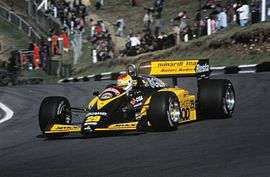
During 1984, Minardi took the decision to enter Formula One the following year.[8] Caliri designed the M184, the team's prototype Formula One car (intended as a dual purpose design for the new Formula 3000) around Alfa Romeo's V8 turbocharged engine but when engineer Carlo Chiti left Alfa Romeo to found Motori Moderni, Minardi became the only customer for his new V6 engine design. The engine was not ready for the start of the 1985 season, so the team converted their M185 chassis to accept a Cosworth DFV engine for the first two races. The single car team was unsuccessful in its first year, scoring no points. The new engine was underpowered and driver Pierluigi Martini finished only two races, although he was also classified 11th at the German Grand Prix despite stopping with engine problems.[9] Martini's best position was 8th in the 1985 Australian Grand Prix, behind Huub Rothengatter in an Osella.
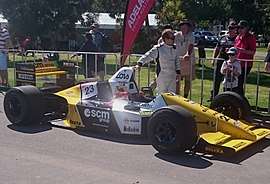
Nonetheless, the team expanded to two cars for the 1986 season. In 1988 Minardi switched to Cosworth engines, and in 1989 it became top entrant for Pirelli's return to Formula One. The team was moderately successful in the midfield through the late 1980s and early 1990s, giving a succession of Italian drivers their first chance at the top level, including Alessandro Nannini, Pierluigi Martini and Gianni Morbidelli. Martini in particular was synonymous with Minardi, eventually having three spells with the team. He drove for them on their debut in 1985, scored their first point in the 1988 United States Grand Prix, although he had been running 5th for quite a long time during the race until being passed by Tyrrell's Jonathan Palmer, took their only front-row start at 1990 USA Grand Prix (aided by special Pirelli tyres; several of their other drivers had surprise qualifying results that day), their only lap leading a race in the 1989 Portuguese Grand Prix, where he finished 5th, and scored their joint-best F1 result up to that point (the other being at the British Grand Prix the same year). In 1991 Minardi became the first team in modern times to make use of customer engines from Ferrari and in 1992 they used Lamborghini V12s. In 1993 Minardi enjoyed a good campaign, collecting seven points thanks to Christian Fittipaldi's fourth place in the 1993 South African Grand Prix and fifth place in the 1993 Monaco Grand Prix and Fabrizio Barbazza sixth places in the 1993 European Grand Prix and 1993 San Marino Grand Prix.
Minardi, Scuderia Italia and Fondmetal (1994–2000)
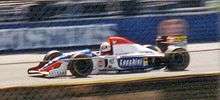
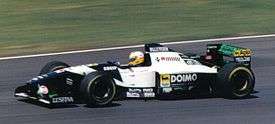
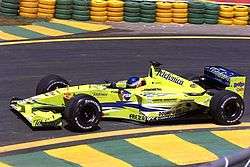
As the number of small teams shrank, Minardi slipped from the mid-field towards the back of the grid. Money woes hit and in 1994 Minardi joined his team with BMS Scuderia Italia in an effort to survive. Giancarlo Minardi retained 14.5% with the remaining 85.5% distributed between the Scuderia Italia investors (Emilio Gnutti, Giuseppe Lucchini and Vittorio Palazzani) and Defendente Marniga. In 1994 Martini finished 5th at both the 1994 Spanish Grand Prix and 1994 French Grand Prix, while Michele Alboreto scored his last point in Formula 1 with a 6th place in the 1994 Monaco Grand Prix. Acknowledging that the team was struggling, Bernie Ecclestone spoke to Flavio Briatore, who agreed to buy a share in the team in 1995. In 1996 Italian businessman Gabriele Rumi, former owner of the Fondmetal team switched his sponsorship support from Tyrrell to Minardi. He gradually increased his interest in the Faenza outfit, becoming co-owner and chairman. In 1997 Minardi teamed up with engine manufacturer Brian Hart. For the 2000 season the team were forced to use 1998-spec Ford Zetec-R V10 engines, which were rebadged as Fondmetal engines in deference to his financial input. However, Rumi's poor health forced him to withdraw his backing at the end of the season.
Points were rare during this time; Pedro Lamy scored his one and only point in Formula 1 with a 6th place in the 1995 Australian Grand Prix; this result was followed by a long barren spell until Marc Gené finished 6th in the 1999 European Grand Prix. That same race, Luca Badoer had been running fourth until his gearbox failed with 13 laps to go, at which point the Italian burst into tears next to his stricken car. Other Minardi drivers also came close to scoring points, including Shinji Nakano who finished 7th at the 1998 Canadian Grand Prix and Esteban Tuero, who finished 8th at the 1998 San Marino Grand Prix.
Minardi was known for not using pay drivers, but for the 2000 season, the team signed Argentinian Gastón Mazzacane, who only acquired the seat thanks to backing from the short-lived pay television channel Pan-American Sports Network.
European Minardi (2001–2005)
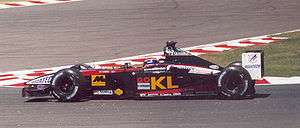
The team, now near collapse, was purchased by Australian businessman Paul Stoddart in early 2001, merging it with his European Racing Formula 3000 team. That season saw Fernando Alonso make his F1 debut for the team at the age of 19; though he (and the team) failed to score any points that year, his performance was impressive enough that the reborn Renault F1 team signed him for 2002. He was replaced by Mark Webber, another future race winner, and heavy attrition at his debut race in Melbourne saw him finish in the points in 5th, with teammate Alex Yoong just outside the points in 7th.
Another memorable episode happened during the 2003 Brazilian Grand Prix. The race was stopped just after 75% distance, after treacherous weather and a sequence of accidents, including a spin into the grass for lead Minardi driver Jos Verstappen. Stoddart later claimed that Verstappen had enough fuel on board to last until just after the time the red flag was eventually waved, due to the large number of safety car laps. Assuming Stoddart was being truthful, Verstappen may well have won this race had he not spun.
During its final years, the Minardi team was almost as famous for its politics as for its racing. Stoddart was described as the Formula One teams' unofficial shop steward. During his time as team principal, Stoddart campaigned for reduced costs in the sport. He appealed to the competing car manufacturers for an agreement where the independent (and, on the whole, financially weaker) teams in Formula One would get cheaper engine deals than at present. In return, the team principals who would benefit from this would support the works teams when it came to opposing new rule changes enforced by the FIA, such as the proposed ban on traction control. Before the start of the 2004 season, however, Stoddart threatened to withdraw his support against the ban on traction control, but later changed his mind. Midway through the 2004 season, the other teams voted to change the unpopular single lap qualifying system back to the old 1 hour format, but Stoddart voted against because it would also mean the 107% rule being reintroduced; this meant the change never occurred, as a unanimous vote was required to change something so significant in the middle of a season. Before the 2005 Australian Grand Prix, Stoddart initially threatened to withdraw his cars if they were made to comply with the revised regulations for 2005, claiming Minardi could not afford to do so. Once again Stoddart ended up withdrawing his threat. Stoddart also repeatedly called for the resignation of the FIA's President, Max Mosley, particularly in the aftermath of the 2005 United States Grand Prix where the majority of teams withdrew from the race due to safety concerns about their Michelin tyres. While Minardi had run Bridgestone tyres, Stoddart had offered to compromise with the Michelin teams but Mosley had rejected it.
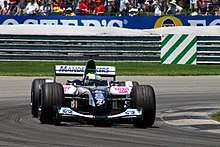
In 2004 Minardi was represented by two rookies, Italian Gianmaria "Gimmi" Bruni and Hungarian Zsolt Baumgartner. During the year, they celebrated their 20th season in F1. Baumgartner scored Minardi's first point in more than 2 years at the United States Grand Prix, finishing 8th (albeit last). Baumgartner was also the first Hungarian to score a point in a World Championship F1 race.
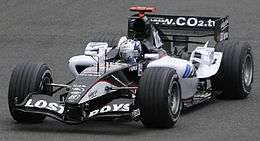
In 2005, Minardi's drivers were Christijan Albers and Patrick Friesacher. They amassed a total of seven points following the debacle of the 2005 United States Grand Prix, in which they finished fifth and sixth (of six runners) respectively. After losing financial backing from his sponsors before the 2005 German Grand Prix, Friesacher was replaced by Dutch Jordan test driver Robert Doornbos, creating the first all-Dutch driver line-up in Formula one since Carel Godin de Beaufort and Ben Pon drove together for the Ecurie Maarsbergen team at the 1962 Dutch Grand Prix at Zandvoort.
Red Bull purchase
In 2005, Paul Stoddart stated that he would sell Minardi if he could find the right buyer. Stoddart claimed that he had 41 approaches.[10] His criterion for a sale was the ability of a buyer to move the team forward and leave the team based in Faenza. The drinks manufacturer Red Bull GmbH, which already owned another Formula One team, Red Bull Racing, decided to set up a second team to promote American drivers that had risen through its young driver programme, Red Bull Driver Search.[11]
Ending several weeks of speculation on 10 September 2005 Red Bull announced it would take control of Minardi in November and run it as their "rookie team" from 2006.[12]
Minardi fans worldwide immediately started an online petition[13] to save the Minardi team name and the team's 20-year heritage in F1 after the news broke. The petition was not successful and the team was renamed Scuderia Toro Rosso for the 2006 season. The greatly increased funding from Red Bull, including the use of the Red Bull chassis and Ferrari engines, gradually led to improved results, culminating in Toro Rosso's only pole position and win at the 2008 Italian Grand Prix. The team was further renamed Scuderia AlphaTauri in 2020 to promote the clothing brand of Red Bull.
Racing return for Minardi
Giancarlo Minardi and Paul Stoddart have both made use of the Minardi name in new motorsport ventures.
On 1 January 2006, Giancarlo Minardi re-acquired certain rights to use the Minardi name in racing. He also announced that he was licensing the Minardi name to established team GP Racing in the junior Euro Formula 3000 series, to be entitled 'Minardi Team by GP Racing'.[14] The team raced with moderate success, scoring a podium in each leg of the Spa round in June 2006.[15] For 2007, Minardi Team by GP Racing combined forces with GP2 team Piquet Sports, to form Minardi Piquet Sports.[16] For 2008 the team was known simply as Piquet Sports.
In 2006, Paul Stoddart declared his intention to enter a new team called 'European Minardi F1 Team Ltd' into Formula One beginning in 2008. His application was unsuccessful, with the 12th place on the grid being awarded to Prodrive.[17] Instead, Stoddart turned his attentions to the U.S.-based Champ Car series. On 18 December 2006, it was confirmed that he had purchased a controlling interest in the CTE Racing-HVM Champ Car team and that the team would be renamed Minardi Team USA.[18] In 2007, the team had reasonable success. Robert Doornbos took two wins and several podium places on his way to third in the series, winning Rookie of the Year honours. When the series folded before its planned 2008 season, Stoddart's involvement ceased, with the team entering the IndyCar Series under the HVM name.
Stoddart retains the right to use the Minardi name for a British-registered company.
Heads of Minardi F1
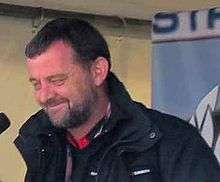
- Owners
- 1985–1995 Giancarlo Minardi
- 1996–1997 Giancarlo Minardi and Flavio Briatore
- 1997–2000 Giancarlo Minardi and Gabriele Rumi
- 2001–2005 Paul Stoddart
- Technical Directors
- 1985–1988 Giacomo Caliri
- 1989–1995 Aldo Costa
- 1996–1998 Gabriele Tredozi
- 1999–2000 Gustav Brunner
- 2001–2005 Gabriele Tredozi
- Sporting Director
- 2001-2004 John Walton
- Commercial / Marketing Directors
- 2001 - 2002 Rupert Manwaring
- 2003 - 2004 Paul Jordan
Complete Formula One results
(key)
| Year | Chassis | Engine | Tyres | Drivers | 1 | 2 | 3 | 4 | 5 | 6 | 7 | 8 | 9 | 10 | 11 | 12 | 13 | 14 | 15 | 16 | 17 | 18 | 19 | Points | WCC |
|---|---|---|---|---|---|---|---|---|---|---|---|---|---|---|---|---|---|---|---|---|---|---|---|---|---|
| 1985 | M185 | Ford DFY 3.0 V8 | P | BRA | POR | SMR | MON | CAN | DET | FRA | GBR | GER | AUT | NED | ITA | BEL | EUR | RSA | AUS | 0 | NC | ||||
| Ret | Ret | ||||||||||||||||||||||||
| Motori Moderni 615-90 1.5 V6 t | Ret | DNQ | Ret | Ret | Ret | Ret | 11 | Ret | Ret | Ret | 12 | Ret | Ret | 8 | |||||||||||
| 1986 | M185B M186 |
Motori Moderni 615-90 1.5 V6 t | P | BRA | ESP | SMR | MON | BEL | CAN | DET | FRA | GBR | GER | HUN | AUT | ITA | POR | MEX | AUS | 0 | NC | ||||
| Ret | Ret | Ret | DNQ | Ret | Ret | Ret | Ret | Ret | Ret | Ret | Ret | Ret | Ret | 8 | Ret | ||||||||||
| Ret | Ret | Ret | DNQ | Ret | Ret | Ret | Ret | Ret | Ret | Ret | Ret | Ret | Ret | 14 | Ret | ||||||||||
| 1987 | M187 | Motori Moderni 615-90 1.5 V6 t | G | BRA | SMR | BEL | MON | DET | FRA | GBR | GER | HUN | AUT | ITA | POR | ESP | MEX | JPN | AUS | 0 | NC | ||||
| DSQ | Ret | Ret | DNS | Ret | Ret | Ret | Ret | Ret | Ret | Ret | Ret | 14 | Ret | Ret | Ret | ||||||||||
| Ret | Ret | Ret | Ret | Ret | Ret | Ret | Ret | 11 | Ret | 16 | 11 | Ret | Ret | Ret | Ret | ||||||||||
| 1988 | M188 | Ford DFZ 3.5 V8 | G | BRA | SMR | MON | MEX | CAN | DET | FRA | GBR | GER | HUN | BEL | ITA | POR | ESP | JPN | AUS | 1 | 10th | ||||
| Ret | 16 | DNQ | DNQ | DNQ | |||||||||||||||||||||
| 6 | 15 | 15 | DNQ | Ret | DNQ | Ret | Ret | Ret | 13 | 7 | |||||||||||||||
| Ret | 11 | Ret | 11 | 13 | Ret | NC | Ret | DNQ | 10 | DNQ | Ret | 8 | 12 | 15 | Ret | ||||||||||
| 1989 | M188B M189 |
Ford DFR 3.5 V8 | P | BRA | SMR | MON | MEX | USA | CAN | FRA | GBR | GER | HUN | BEL | ITA | POR | ESP | JPN | AUS | 6 | 11th | ||||
| Ret | Ret | Ret | Ret | Ret | Ret | Ret | 5 | 9 | Ret | 9 | 7 | 5 | Ret | 6 | |||||||||||
| Ret | |||||||||||||||||||||||||
| Ret | Ret | Ret | DNQ | Ret | Ret | DNQ | 6 | DNQ | Ret | 15 | 8 | 12 | Ret | Ret | DNQ | ||||||||||
| 1990 | M189B M190 |
Ford DFR 3.5 V8 | P | USA | BRA | SMR | MON | CAN | MEX | FRA | GBR | GER | HUN | BEL | ITA | POR | ESP | JPN | AUS | 0 | NC | ||||
| 7 | 9 | DNS | Ret | Ret | 12 | Ret | Ret | Ret | Ret | 15 | Ret | 11 | Ret | 8 | 9 | ||||||||||
| Ret | Ret | 11 | Ret | DNQ | 14 | DNQ | 12 | Ret | 15 | Ret | DNQ | DNQ | DNQ | ||||||||||||
| Ret | Ret | ||||||||||||||||||||||||
| 1991 | M191 | Ferrari 037 3.5 V12 | G | USA | BRA | SMR | MON | CAN | MEX | FRA | GBR | GER | HUN | BEL | ITA | POR | ESP | JPN | AUS | 6 | 7th | ||||
| 9 | Ret | 4 | 12 | 7 | Ret | 9 | 9 | Ret | Ret | 12 | Ret | 4 | 13 | Ret | Ret | ||||||||||
| Ret | 8 | Ret | Ret | Ret | 7 | Ret | 11 | Ret | 13 | Ret | 9 | 9 | 14 | Ret | |||||||||||
| 16 | |||||||||||||||||||||||||
| 1992 | M191B M191L M192 |
Lamborghini 3512 3.5 V12 | G | RSA | MEX | BRA | ESP | SMR | MON | CAN | FRA | GBR | GER | HUN | BEL | ITA | POR | JPN | AUS | 1 | 12th | ||||
| Ret | Ret | Ret | 11 | Ret | 8 | 13 | DNQ | DNQ | DNQ | 12 | 6 | 9 | |||||||||||||
| DNQ | Ret | DNQ | |||||||||||||||||||||||
| Ret | Ret | 7 | Ret | Ret | Ret | 11 | 8 | 17 | 12 | DNQ | 16 | Ret | 14 | 14 | 10 | ||||||||||
| 1993 | M193 | Ford HBC6 3.5 V8 | G | RSA | BRA | EUR | SMR | ESP | MON | CAN | FRA | GBR | GER | HUN | BEL | ITA | POR | JPN | AUS | 7 | 8th | ||||
| 4 | Ret | 7 | Ret | 8 | 5 | 9 | 8 | 12 | 11 | Ret | Ret | 8 | 9 | ||||||||||||
| Ret | Ret | ||||||||||||||||||||||||
| Ret | Ret | 6 | 6 | Ret | 11 | Ret | Ret | ||||||||||||||||||
| Ret | 14 | Ret | Ret | 7 | 8 | 10 | Ret | ||||||||||||||||||
| 1994 | M193B M194 |
Ford HBC7/8 3.5 V8 | G | BRA | PAC | SMR | MON | ESP | CAN | FRA | GBR | GER | HUN | BEL | ITA | POR | EUR | JPN | AUS | 5 | 10th | ||||
| 8 | Ret | Ret | Ret | 5 | 9 | 5 | 10 | Ret | Ret | 8 | Ret | 12 | 15 | Ret | 9 | ||||||||||
| Ret | Ret | Ret | 6 | Ret | 11 | Ret | Ret | Ret | 7 | 9 | Ret | 13 | 14 | Ret | Ret | ||||||||||
| 1995 | M195 | Ford EDM 3.0 V8 | G | BRA | ARG | SMR | ESP | MON | CAN | FRA | GBR | GER | HUN | BEL | ITA | POR | EUR | PAC | JPN | AUS | 1 | 10th | |||
| DNS | Ret | 12 | 14 | 7 | Ret | Ret | 7 | Ret | |||||||||||||||||
| 9 | 10 | Ret | Ret | 9 | 13 | 11 | 6 | ||||||||||||||||||
| Ret | DNS | 14 | Ret | Ret | 8 | 13 | 10 | Ret | 8 | Ret | Ret | 14 | 11 | 15 | 9 | Ret | |||||||||
| 1996 | M195B | Ford ED2 3.0 V8 Ford ED3 3.0 V8 |
G | AUS | BRA | ARG | EUR | SMR | MON | ESP | CAN | FRA | GBR | GER | HUN | BEL | ITA | POR | JPN | 0 | NC | ||||
| Ret | 10 | Ret | 12 | 9 | Ret | Ret | Ret | 12 | Ret | 12 | Ret | 10 | Ret | 16 | 12 | ||||||||||
| Ret | 13 | Ret | Ret | Ret | 8 | Ret | 11 | ||||||||||||||||||
| Ret | Ret | ||||||||||||||||||||||||
| DNQ | 10 | DNQ | Ret | 15 | DNQ | ||||||||||||||||||||
| 1997 | M197 | Hart 830 AV7 3.0 V8 | B | AUS | BRA | ARG | SMR | MON | ESP | CAN | FRA | GBR | GER | HUN | BEL | ITA | AUT | LUX | JPN | EUR | 0 | NC | |||
| Ret | 18 | Ret | 11 | 10 | Ret | Ret | 11 | Ret | Ret | 10 | 14 | Ret | 11 | Ret | Ret | 17 | |||||||||
| 9 | 12 | 9 | DNS | Ret | 15 | Ret | |||||||||||||||||||
| Ret | 10 | Ret | 12 | Ret | 14 | EX | Ret | Ret | 15 | ||||||||||||||||
| 1998 | M198 | Ford JD Zetec-R 3.0 V10 | B | AUS | BRA | ARG | SMR | ESP | MON | CAN | FRA | GBR | AUT | GER | HUN | BEL | ITA | LUX | JPN | 0 | NC | ||||
| Ret | Ret | 13 | Ret | 14 | 9 | 7 | 17 | 8 | 11 | Ret | 15 | 8 | Ret | 15 | Ret | ||||||||||
| Ret | Ret | Ret | 8 | 15 | Ret | Ret | Ret | Ret | Ret | 16 | Ret | Ret | 11 | Ret | Ret | ||||||||||
| 1999 | M01 | Ford VJM1 Zetec-R 3.0 V10 Ford VJM2 Zetec-R 3.0 V10 |
B | AUS | BRA | SMR | MON | ESP | CAN | FRA | GBR | AUT | GER | HUN | BEL | ITA | EUR | MAL | JPN | 1 | 10th | ||||
| Ret | 8 | Ret | Ret | 10 | 10 | Ret | 13 | 10 | 14 | Ret | Ret | Ret | Ret | Ret | |||||||||||
| Ret | |||||||||||||||||||||||||
| Ret | 9 | 9 | Ret | Ret | 8 | Ret | 15 | 11 | 9 | 17 | 16 | Ret | 6 | 9 | Ret | ||||||||||
| 2000 | M02 | Fondmetal RV10 3.0 V10 | B | AUS | BRA | SMR | GBR | ESP | EUR | MON | CAN | FRA | AUT | GER | HUN | BEL | ITA | USA | JPN | MAL | 0 | NC | |||
| 8 | Ret | Ret | 14 | 14 | Ret | Ret | 16 | 15 | 8 | Ret | 15 | 14 | 9 | 12 | Ret | Ret | |||||||||
| Ret | 10 | 13 | 15 | 15 | 8 | Ret | 12 | Ret | 12 | 11 | Ret | 17 | 10 | Ret | 15 | 13 | |||||||||
| 2001 | PS01 PS01B |
European 3.0 V10 | M | AUS | MAL | BRA | SMR | ESP | AUT | MON | CAN | EUR | FRA | GBR | GER | HUN | BEL | ITA | USA | JPN | 0 | 11th | |||
| Ret | 14 | 9 | Ret | 16 | Ret | Ret | 9 | Ret | 15 | DNQ | Ret | Ret | 13 | ||||||||||||
| Ret | Ret | 16 | |||||||||||||||||||||||
| 12 | 13 | Ret | Ret | 13 | Ret | Ret | Ret | 14 | 17 | 16 | 10 | Ret | Ret | 13 | DNS | 11 | |||||||||
| 2002 | PS02 | Asiatech AT02 3.0 V10 | M | AUS | MAL | BRA | SMR | ESP | AUT | MON | CAN | EUR | GBR | FRA | GER | HUN | BEL | ITA | USA | JPN | 2 | 9th | |||
| 7 | Ret | 13 | DNQ | DNS | Ret | Ret | 14 | Ret | DNQ | 10 | DNQ | 13 | Ret | Ret | |||||||||||
| Ret | Ret | ||||||||||||||||||||||||
| 5 | Ret | 11 | 11 | DNS | 12 | 11 | 11 | 15 | Ret | 8 | Ret | 16 | Ret | Ret | Ret | 10 | |||||||||
| 2003 | PS03 | Cosworth CR-3 3.0 V10 | B | AUS | MAL | BRA | SMR | ESP | AUT | MON | CAN | EUR | FRA | GBR | GER | HUN | ITA | USA | JPN | 0 | 10th | ||||
| Ret | Ret | Ret | Ret | 11 | 13 | Ret | Ret | 13 | 14 | 16 | |||||||||||||||
| 12 | 13 | 12 | 11 | 16 | |||||||||||||||||||||
| 11 | 13 | Ret | Ret | 12 | Ret | Ret | 9 | 14 | 16 | 15 | Ret | 12 | Ret | 10 | 15 | ||||||||||
| 2004 | PS04B | Cosworth CR-3L 3.0 V10 | B | AUS | MAL | BHR | SMR | ESP | MON | EUR | CAN | USA | FRA | GBR | GER | HUN | BEL | ITA | CHN | JPN | BRA | 1 | 10th | ||
| Ret | 14 | 17 | Ret | Ret | Ret | 14 | Ret | Ret | 18 | 16 | 17 | 14 | Ret | Ret | Ret | 16 | 17 | ||||||||
| Ret | 16 | Ret | 15 | Ret | 9 | 15 | 10 | 8 | Ret | Ret | 16 | 15 | Ret | 15 | 16 | Ret | 16 | ||||||||
| 2005 | PS04B PS05 |
Cosworth CR-3L 3.0 V10 Cosworth TJ2005 3.0 V10 |
B | AUS | MAL | BHR | SMR | ESP | MON | EUR | CAN | USA | FRA | GBR | GER | HUN | TUR | ITA | BEL | BRA | JPN | CHN | 7 | 10th | |
| 17 | Ret | 12 | Ret | Ret | Ret | 18 | Ret | 6 | Ret | 19 | |||||||||||||||
| 18 | Ret | 13 | 18 | 13 | Ret | 14 | 14 | ||||||||||||||||||
| Ret | 13 | 13 | Ret | Ret | 14 | 17 | 11 | 5 | Ret | 18 | 13 | NC | Ret | 19 | 12 | 14 | 16 | 16 |
See also
References
- "Red Bull Finalizes Minardi Deal". Motorsport. Retrieved 19 September 2018.
- "F1 reveals human side after Walton death". Independent. Retrieved 19 September 2018.
- "LEGEND OF MINARDI F1 – THE LITTLE TEAM THAT TOOK ON THE GIANTS OF F1". Columnm. Retrieved 19 September 2018.
- "Review of the Year: 10th - Minardi". Grand Prix. Retrieved 19 September 2018.
- Constructors: Minardi GrandPrix.com; Retrieved 2 August 2006
- A samba that never got into tune 8W, October 2000; Retrieved 10 August 2006.
- Hodges, David (1998). A–Z of Formula Racing Cars 1945–1990. Bay View books. p. 194. ISBN 1-901432-17-3.
- "Minardi History". Italia Speed. Retrieved 19 September 2018. Italic or bold markup not allowed in:
|publisher=(help) - Nye, Doug (1986). Autocourse history of the Grand Prix car 1966–85. Hazleton publishing. p. 226. ISBN 0-905138-37-6.
- Irvine in talks over Minardi sale BBC Sport, 2 September 2005
- "Red Bull to buy Minardi". RTE. Retrieved 30 August 2018.
- Red Bull swoop for Minardi deal BBC Sport, 10 September 2005
- ForzaMinardi.com 2005 Forza Minardi; Retrieved 28 May 2015
- Minardi name back in racing ITV Sport; Retrieved 2 August 2006 Archived January 22, 2009, at the Wayback Machine
- "Double" podium for the Minardi team in Spa Minardi; Retrieved 2 August 2006 Archived December 26, 2007, at the Wayback Machine
- "Minardi moving on up" GrandPrix.com, 3 October 2006
- Stoddart to re-enter F1 with Minardi in 2008 F1Racing.net, retrieved 2 August 2006 Archived June 19, 2006, at the Wayback Machine
- "Champ Car News: Stoddart confirms Champ Car move". Autosport. 18 December 2006. Retrieved 18 December 2006.
Further reading
- Vigar, Simon (2008). Forza Minardi!. Veloce Publishing. ISBN 978-1-84584-160-7.
- Pasini, Stefano (2010). Gian Carlo Minardi racconta 35 anni di gare: dalla Formula Italia alla Formula 1. C&C. ISBN 978-88-86622-91-2.
External links
| Wikimedia Commons has media related to Minardi. |
- Minardi Sito Ufficale
- Minardi Team International Site Minardi Team International Site
- Minardi's F1 history Chequered Flag Motorsport
- ForzaMinardi.com - English fan site
- Formula Two championship results
- Minardi F1 Chassis Design Case History NEI Software